You say potato, I say leprosy
Links 'n' updates for Fall 2025
This is the quarterly links ‘n’ updates post, a collection of things I’ve been reading and doing for the past few months.
(1) YOU SAY POTATO, I SAY LEPROSY
As late as 1813, some parts of the European medical establishment believed that potatoes cause leprosy. (Don’t even get ‘em started on scrofula!) Potato historian Salaman Redcliffe suggests that people were skeptical because potatoes look kinda weird, they grow in the ground, and you plant them as tubers rather than seeds, which are all extremely suspicious things for a food to do.
(2) THE MARKET FOR LULULEMONS
You may remember the Spurious Correlations website, which dredges up random datasets and finds correlations between them—for instance, Lululemon’s stock price and the popularity of the first name Stevie. Now thanks to AI, each one of those correlations can be instantly turned into a full academic paper, like: LULU-LEMONADE: A STATISTICAL STUDY OF THE STEVIE-NIZED MARKET.
Sadly, this technology makes many academic departments completely redundant.
(3) MURDER, SHE DIDN’T WRITE
Via Jeff-alytics: there’s a good chance that 2025 will have the fewest murders ever recorded in the US. (We only have reliable data going back to 1960).
(4) CATHETER? I HARDLY KNOW ‘ER
I just added a new entry to my list of all-time great blog posts: Ask not why would you work in biology, but rather: why wouldn’t you?, by Abhishaike Mahajan of Owl Posting. An excerpt:
Yes, biology is very interesting, yes, biology is very hard to do well. Yet, it remains the only field that could do something of the utmost importance: prevent a urinary catheter from being shunted inside you in the upcoming future.
(5) According to the Doomsday Scoreboard, there have been over 200 failed apocalypse predictions and, uh, zero successful ones.
(6) BREAKIN’ BACON
Before World War I, the US government had basically no cryptographic capacity. So when the war broke out and suddenly they needed people to do code-breaking, where did they turn? To the Riverbank Institute, which had been set up by “Colonel” George Fabyan to decode the most important cipher of all: the one that supposedly proved the works of Shakespeare were written by Francis Bacon. Elizebeth and William Friedman, the couple who broke that cipher while working at Riverside, went on to become the first cryptologists at the precursor to the National Security Agency.12
(7) WHAT IS IT GOOD FOR?
One of the wildest blog posts I’ve read this year is about an American guy going to fight in the Ukraine war. Honestly, it sounds like a huge bummer: you squat in a trench and pretend to shoot at Russians and hope to not be killed by a drone.
(8) O-PEN YOUR MIND
When I saw David R. MacIver’s post called How Pen Caps Work, I was like, “what do you mean? Pen caps work by...being....caps for pens”. Apparently not: for fountain pens, anyway, pen caps work through vacuum power. Putting the cap on and taking it off causes a tiny amount of suction that draws the ink into the nib.
(9) NEMATODE YOU SO
Chenchen Li, who was one of the winners of my 2025 blog post competition, has a great series on why neuroscientists still can’t simulate a worm:
I told [my mom] that this is what my job feels like—each animal has a different kind of radio in its head and/or body, and neuroscientists are trying to figure out things about them. Some neuroscientists want to fix radios; some want to build better radios. Others, like me, are just trying to understand them.
To which Li’s mom responded:
Other nematode fun facts from Li’s piece: they use static electricity to teleport themselves onto bumblebees as a way of getting around:
And...nematodes survived the Space Shuttle Columbia explosion??
(10) VIDEO DIDN’T KILL THE RADIO(LOGY) STAR
More great work from a 2025 Blog Extravaganza honoree: Deena Mousa has a terrific article in Works in Progress: Why Isn’t AI Replacing Radiologists? Radiology was supposed to be the first medical speciality to be rendered obsolete by AI. Instead, radiology jobs are more numerous and salaries are higher than ever.
(11) SAME AS IT EVER WAS
The Polarization Dashboard is a useful sanity check against current events. Whenever something big happens in politics, people are like “WOW OUR VERY SOULS HAVE PERMANENTLY CHANGED” when in fact people almost always have the same opinions that they did yesterday. Here’s the change in support for murdering members of the opposite political party over time. Currently, <2% of Democrats and Republicans support it. (h/t Amanda Ripley)
See also: You’re Probably Wrong About How Things Have Changed.
(12) THINGS COULD STILL BE BETTER
Some beginner researchers successfully replicated my Things Could Be Better paper without any expert help. I’m really proud of this! Violet Henriques, who ran the workshop, writes:
I did not help replicate this study because the group replicating Measures of Anchoring in Estimation Tasks [the other study being replicated] needed help understanding the language the paper was written in. In contrast the group replicating Things Could Be Better started their own replication within 15 minutes of being handed the paper and did not have any followup questions for me before they began the replication.
(13) FAKES AND PAINS
Two years ago a Harvard Business School professor named Francesca Gino was fired for faking her data. (I wrote about the debacle here.) She sued the bloggers who outed her, but that lawsuit was thrown out. She also sued Harvard, claiming discrimination. Now Harvard is suing Gino back, alleging that when Gino submitted data to prove prove that her original data wasn’t fake...the new data was fake, too.
(14) dynomight will show you colors you’ve never seen before and he promises to do it WITHOUT shooting lasers into your eyes
(15) HONEY I SHRUNK THE SCIENCE FUNDING BUDGET
Matt Clancy and his friends ask: What if the NIH had been 40% smaller?. I appreciate how circumspect the authors are, but the short answer seems to be, “We would be significantly worse off, because many important medicines rely on research that would not have happened under a smaller budget”. This is further evidence of just how important it is to invest in science: even when we do it in a totally boneheaded way, it somehow still pays off.
(16) CULT OF PERSONALITY
Recently, the Financial Times set the internet alight with these graphs:
Christopher J Ferguson, Ph.D. re-analyzed the data and claims the changes in conscientiousness are minimal, if they exist at all. I’m inclined to trust Ferguson’s account on this one: it’s super weird to see such huge changes in such small amounts of time on basically any psychological variables.
(17) PERSONA NON GRATA
Speaking of personality, ClearerThinking now has one mega personality test that will give you all your results from a bunch of different tests at once. I previously cited their work showing that supposedly scientific personality tests do not obviously outperform the bullshit ones, which continues to boggle people’s minds whenever I bring it up.
(18) DISSONANCE ABOUT DISSONANCE
One of the most famous psychology experiments of all time is Festinger and Carlsmith (1959), the classic demonstration of cognitive dissonance. The psychologist Matti Heino points out, though, that the main results literally don’t add up. In the table below, the circled means are impossible given the reported sample size—there’s no way to get an average of 3.08, for instance, if you have 20 people giving ratings on a 0-10 scale.
I used to be one of those people who was like “well cognitive dissonance has been replicated in hundreds of studies” but it’s not like I ever actually read those studies. It just kinda seems like, c’mon! It’s cognitive dissonance! Everybody knows cognitive dissonance! Anyway, when a bunch of labs tried to replicate another classic demonstration of cognitive dissonance, they found no effect.3 And a new paper claims that When Prophecy Fails, a landmark book that documented the effects of cognitive dissonance in a doomsday cult, may have been greatly embellished or deliberately orchestrated by the authors.4 None of this means that cognitive dissonance doesn’t or can’t exist, but it does make me feel a whole lot of, uh, dissonance.
(19) Maxwell Tabarrok: air travel has gotten safer, cheaper, and less reliable
(20) THE FAULT IN OUR MICHELIN STARS
According to this study, losing a Michelin star improves TripAdvisor ratings. This is probably because getting a star invites harsher judgment (“It’s good, but...is it Michelin good?”). The perfect restaurant is one that raises your expectations high enough to get you to come in, but leaves your expectations low enough that you can still be wowed.
This is a hard target to hit: I’ve only ever seen two restaurants that have a 4.9 on Google after receiving thousands of ratings. Both of them are Thai restaurants that are nice but not fancy and cool but not trendy—you go expecting good Thai food and you get fantastic Thai food, and everybody goes, “wow, this place should have a Michelin star!”
(21) HIGH POTENTIAL
Daniel Yudkin at The Beacon Project debuts a new civic vision called “Potentialism”: everybody’s got something special about them, and they have the right and responsibility to cultivate it and use it for the good of all. In a country where most people don’t like either party very much (which we know about thanks to Yudkin’s research), we should be doing a lot more ideological experimentation like this.
(22) During the Cold War, both the US and the USSR made plans to nuke the moon??5 (via Malmesbury)
(23) PHD-PRESSION
A new paper tracked all PhD students in Sweden and found that they’re more likely to take psychiatric medication compared to a matched group who stopped their education at the master’s level. This isn’t randomized and we should assume these two groups differ in lots of ways. But the fact that the differences grow over time and then disappear at year seven, when most people who started their PhDs have now finished them, does suggest that getting your doctorate is distressing.
(24) DIRTY JOBS
Goodhart’s Law in action: The Army Corps of Engineers hired contractors to clear debris after the 2017 wildfires in California, but unfortunately they paid by the ton, incentivizing the contractors to dig up a bunch of wet mud and use it to weigh down their loads. Filling in the holes left by the contractors is “estimated to cost another $3.5 million”.
(25) Michael Dean of Essay Architecture is offering a $10k prize for the best essay, as judged by humans and his writing AI.
(26) GETTING T-REX’D
I’ve seen some wild visual illusions in my time, but this one had me screaming “no...no...no no no NO NO NO NOOO”
NEWS FOR LIZARDS
Items of note for people who do science independently and people who like that sort of thing. Original post here.
The Existential Hope Foundation is offering a $10k prize for the “most inspiring, uplifting, and forward-looking memes”.
CasualPhysicsEnjoyer has been building UV sterilization pumps and growing yeast in a DIY laboratory. See also: Why Independent Science Now?
Alex Chernavsky started taking metformin and found that it didn’t do much for his blood sugar but it did, surprisingly, improve his reaction times:
UPDATES FROM EXPERIMENTAL HISTORY HQ
I got a lot of thoughtful responses to my recent post on the decline of deviance, including this one from the classical musician Ema Katrovas. Many people think the internet is to blame, but we forget how recently the internet became the internet. As late as 2007, only half of households had broadband at home. Instagram only launched in 2010. The early, slow, text-based internet lived in a room in your house and you had to choose between using it and allowing your grandma to call you; it was nothing like the one that lives in your pocket. So the transition from the 1990s to the 2000s, where we see many forms of deviance declining, is not really the transition from “pre-internet” to “post-internet”. That transition happened somewhere around 2012, when a majority of people got a smartphone. That’s why I think the internet as we know it today may act as an accelerant, but I don’t think it caused the decline of deviance in the first place.
In other news:
I talked to Derek Thompson about why Americans are so afraid of talking to each other.
Chris Dalla Riva answered all my questions about music, including “What are the weirdest lyrics in a #1 hit single?”
Finally, a post from two years ago. A friend of mine recently told me, “Sometimes I want to send this post to someone, but then I remember what you titled it.”
I encountered this anecdote in Stuart Buck’s excellent Case for Crazy Philanthropy.
100 years later, the cryptographer/game developer Elonka Dunin visited the Friedmans’ grave and found they left a secret code on their tombstone.
This isn’t the Festinger and Carlsmith version, but another way of eliciting the effect, where people have to write an essay that goes against their beliefs.
Thanks to an “alert reader” for bringing this to my attention.
Which means Mr. Show was right all along.



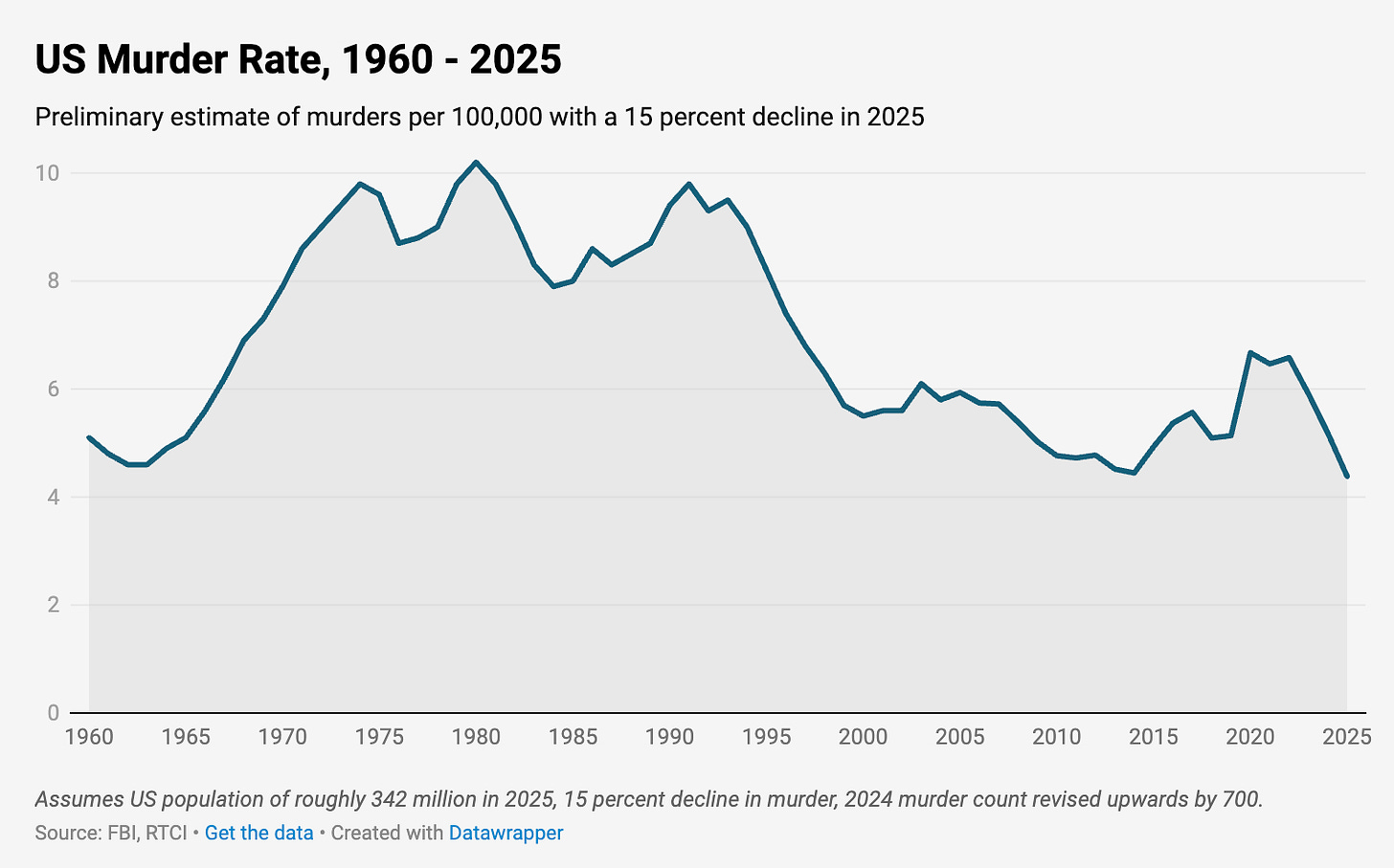


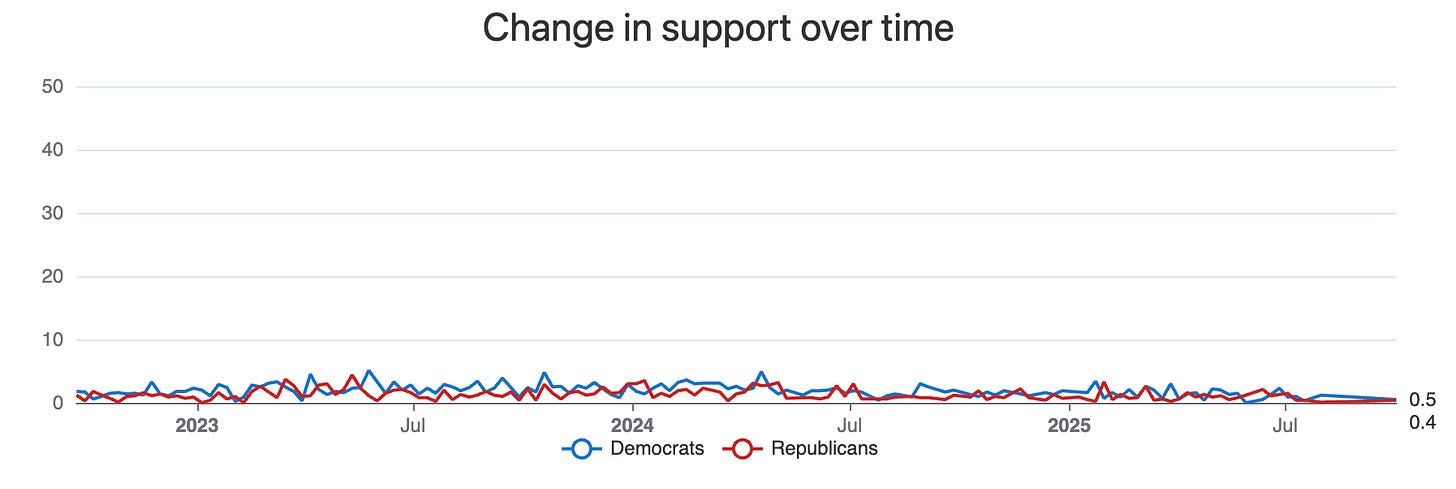
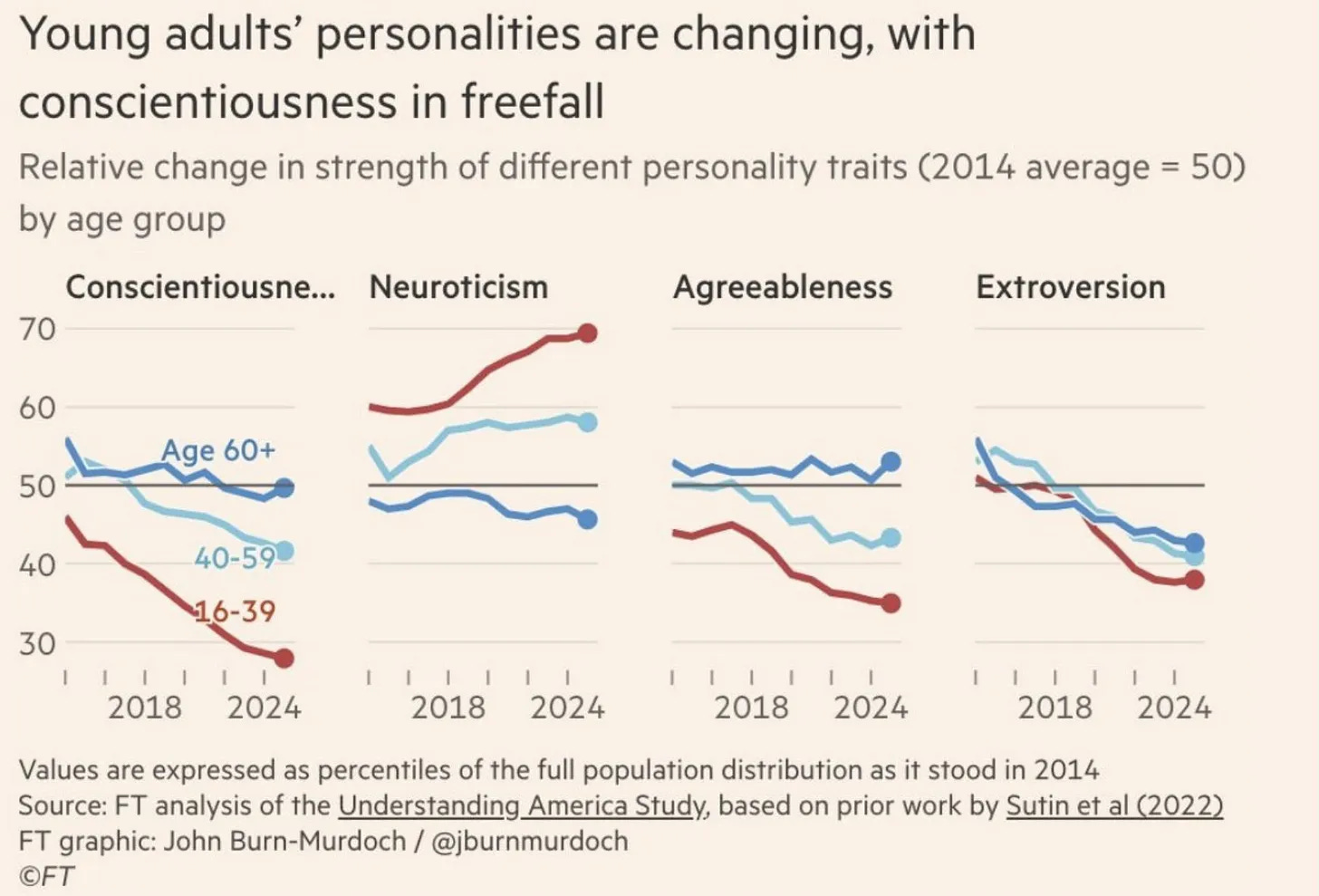
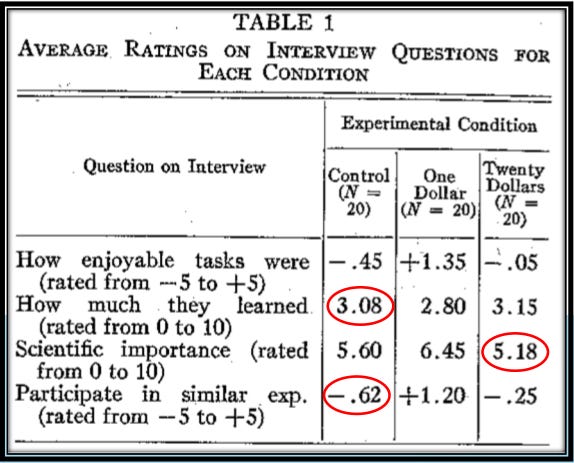
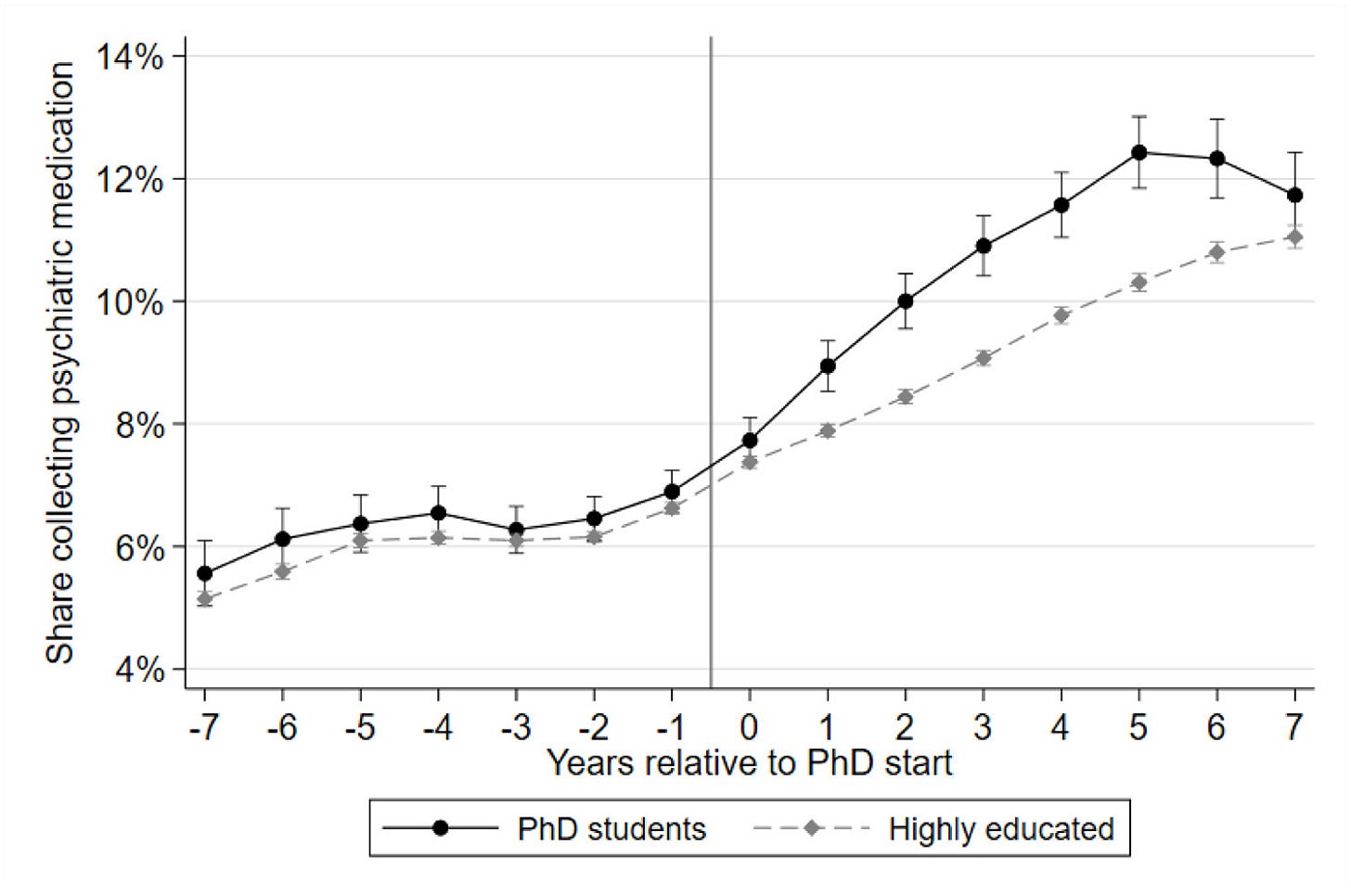
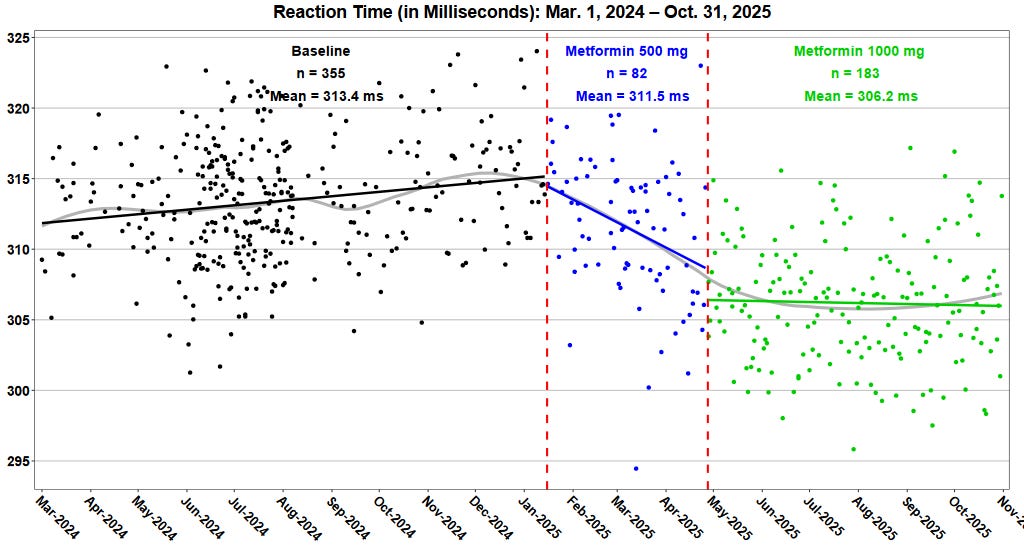
> Whenever something big happens in politics, people are like “WOW OUR VERY SOULS HAVE PERMANENTLY CHANGED” when in fact people almost always have the same opinions that they did yesterday... Currently, <2% of Democrats and Republicans support [political assassination].
Without wishing to comment directly on the object-level question, I'd point out:
- Some phenomena are driven by bulk behavior and some are driven by tail risk. For assassinations, it probably matters more how the 99.99999th percentile "AQ" people feel than how the median American feels, or even how the 99th percentile American feels.
- It's hard to resolve any rare attitude, especially a *taboo* rare attitude, to a resolution greater than Lizardman's Constant.
Happy you enjoyed the biology article!